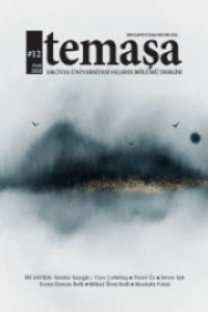Political Philosophy and Oriental Polemics on the OttomanForm of Government in 18th Century English Literature
___
Aristotle. Aristotelis Politica, edited by Ross, W. D. Oxford: Oxford University Press, 1957.Aquinas, T. “The Nature and Domain of Sacred Doctrine”. Critical Theory Since Plato, edit. by Hazards Adams.University of Washington Press: Florida, 1982.
Augustine, Saint. “On Christian Doctrine”. Critical Theory Since Plato, edited by Hazards Adams. University of Washington Press: Florida, 1982.
Aubin, P. The Strange Adventure of Count de Vinevil. Blackmask Online. 5. May. 2002.
Beckford, W. The History of Caliph Vathek. Oxford: Oxford University Press, 1983.
Braude, B. & Lewis, B. Christians and Jews in the Ottoman Empire; The Functioning of Plural Society. New York: Holmes & Meier Pub. Inc., 1982.
Craven, E. A Journey Through the Crimea to Constantinople. London: G.G.J. and J. Robinson Co., 1939.
D’ohsson, M. 18. Yüzyıl Türkiyesinde Örf ve Adetler. İstanbul: Tercüman Gazetesi Matbaası, 1981.
Dryden, J. “Annus Mirabilis”. TheNortonAnthologyofEnglishLiterature, Ed. M.H. Abrams. New York: Nor-ton & Company, Inc., 1986-1789-1791.
Faroqhi, S. Subjects of the Sultan: Culture and Daily Life in the Ottoman Empire. New York: I.B. Tauris, 1989.
Goffman, D. Britons in the Ottoman Empire, 1642-1660. Seattle: University of Washington Press, 1998. --- The Ottoman Empire And The Early Modern Europe: Cambridge: CUP, 2002.
Hobbes, T. Leviathan, From Reason at Work, Introductory Readings in Philosophy, Ed. M. Cahn et al., New York: Harcourt Brace Jovanovich Publishers, 1984. 169-181.
Hume, D. “The Problem of Induction, An Inquiry Concerning Human Understanding”. Reason at Work Intro-ductory Reading in Philosophy. Ed. M.C. Steven, New York: Harcourt Brace Jovanovich Publishers, 1984. 30 6. 318.
---Dialogues Concerning Natural Religion: Edit. By Selby, 02 October 2007.
Johnson, S. The History of Rasselas, Prince of Abyssinia. London: A.J.F. Collins And University Tutorial Press, 1964.
Kabbani, R. Europe’s Myth of Orient. London: Macmillan, 1986.
Kaiser, T. The Debate on Turkish Despotism in Eighteenth Century French Political Culture. Chicago:The Uni-versity of Chicago online source, 2000.
Knolles, R. The Generall Historie of the Turkes... London: Printed by Adam Islip, 1621.
Lewis, B. Islam and The West. New York: Oxford University Press, , 1993.
--- Istanbul and The Civilization of the Ottoman, Empire: University of Oklahoma Press, Oklahoma1989.Lewis, R. Rethinking Orientalism Women, Travel and the Ottoman Harem. New Jersey: Rutgers University Press, 2004.
Locke, J. “An Inquiry Concerning Human Understanding”, from Reason at Work Introductory Reading in Phi-losophy. Ed. M. Cahn et al., New York: Harcourt Brace Jovanovich Publishers, 1984. 292-305.
-----1689, Two Treatises of Government, Peter Laslett (ed.), Cambridge: Cambridge University Press, 1988. Citations are to Two Treatises then treatise and section.
Marana, P.G. Letters Written by a Turkish Spy, Ed. Arthur Weitzman. New York: Temple University Publica-tion, 1970.
Machiavelli, N. The Prince, Dover Thrift Publication, New York, 1992, USA.
Montagu, L.M.W. Turkish Embassy Letters. Athens G.A.: University of Georgia Press, 1993.
Montesquieu, C. S. Persian Letters. Translated by C.J. Betts. Middlesex: Penguin, 1973.
Plato, The Republic, Critical Theory Since Plato, Edited by Hazards Adams, University of Washington Press, Florida, 1982.
Rycaut, P. The Present State of the Ottoman Empire. Farnborough: Gregg International Pub. Ltd., 1972.
Said, E. Orientalism. New York: Penguin, 1984.
https://plato.stanford.edu/entries/plato-ethics-politics/
https://plato.stanford.edu/entries/aristotle-politics/
https://plato.stanford.edu/entries/locke-political/
- ISSN: 2148-371X
- Yayın Aralığı: 2
- Başlangıç: 2014
- Yayıncı: Prof. Dr. Arslan Topakkaya / Erciyes Üniversitesi Felsefe Bölümü
Efendi-Köle İkiliğine İlişkin Üç Açıklama
Gerard’t Hooft’da Determinizm ve Özgür İrade
Mehmet Emin ŞEKER, Lokman ÇİLİNGİR
İktisadın İnsanı İçin Yeni Bir Eidos Önerisi: Rasyonalite YerineÖzgürlük
Felsefe Bilmemeye Katlanabilir mi?: Heidegger’de Hakikatin Bir Hakikat-Olmayan Olarak İfşa Edilmesi
Bir Akıl Yürütmeyi Sağlam Yapan Nedir?
Charles S. PEİRCE, Çevirmen: Bilal GENÇ
İnsan Haklarında Kuşaklar Tartışması ve Bir Çözüm Denemesi
Heidegger Düşüncesinde Teknikleşmiş Hayvan Olarak Modern İnsan
